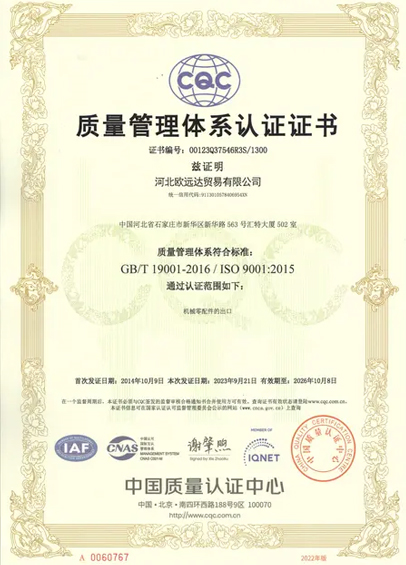Mobile:+86-311-808-126-83
Email:info@ydcastings.com
English
hydraulic impeller
Understanding Hydraulic Impellers Key Components in Fluid Dynamics
Hydraulic impellers play a crucial role in various industrial applications, particularly in pumping systems, water treatment, and automotive engines. These components are vital for generating the flow of fluid, which is essential for the efficient operation of numerous machinery and processes.
At its core, a hydraulic impeller is designed to transfer energy from a motor to the fluid, increasing the fluid's velocity and pressure as it moves through a system. Typically constructed from durable materials such as stainless steel or high-grade plastics, impellers are engineered to withstand the harsh conditions often present in hydraulic applications, including high pressure and corrosive environments.
The design of hydraulic impellers is intricate and significantly impacts their performance
. Impellers feature blades that can be configured in various shapes and sizes, depending on the specific application requirements. The pitch, diameter, and number of blades are all carefully calculated to optimize fluid flow characteristics. A well-designed impeller minimizes turbulence, ensuring smooth and efficient operation while maximizing the flow rate.hydraulic impeller

In hydraulic systems, the impeller works in conjunction with a casing or volute. As the impeller spins, it creates a low-pressure area at the inlet, allowing fluid to be drawn in from the source. Subsequently, the swirling motion of the impeller blades directs the fluid outward toward the discharge outlet, converting kinetic energy into pressure energy. This transformation is essential for applications such as irrigation systems, industrial pumps, and even in turbines used for energy generation.
The performance of hydraulic impellers can be influenced by several factors, including the speed of rotation and the viscosity of the fluid being pumped. Engineers often conduct detailed analyses and simulations to predict the performance characteristics of an impeller within a particular hydraulic system. By understanding these dynamics, they can design more efficient systems that consume less energy and operate more effectively.
In conclusion, hydraulic impellers are indispensable components in the realm of fluid dynamics. Their ability to efficiently convert energy to drive fluid flow makes them vital in numerous applications across various industries. As technology continues to advance, the design and manufacturing processes of hydraulic impellers are likely to evolve, leading to even higher efficiencies and expanded capabilities in fluid management systems.
-
Superior Aluminum Castings in Automotive Engine PartsNewsAug.22,2025
-
Common Materials Used in Fan Housing ManufacturingNewsAug.22,2025
-
Symptoms of a Stuck Automobile Water Pump ImpellerNewsAug.22,2025
-
The Importance of Valve Castings in Water TreatmentNewsAug.22,2025
-
Welding Techniques for End Cap Stainless Steel FittingsNewsAug.22,2025
-
How to Install a Water Pump Connector ProperlyNewsAug.22,2025











